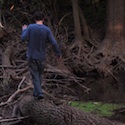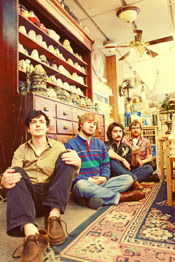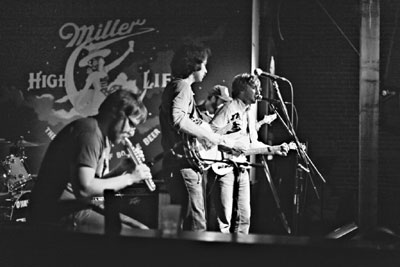
Frontier Ruckus
Aaron Shaul

Mystical realism, a mixture of factual and fantastic elements, is a concept perhaps most embodied by Gabriel Garcia Marquez’s great novel One Hundred Years of Solitude. In the world of music, Michigan’s Frontier Ruckus stands virtually alone in laying claim to this type of storytelling. Songwriter Matt Milia’s seemingly stream-of-consciousness and impressionistic study of southeast Michigan’s cultural and commercial landmarks and the depths of disuse to which Detroit and its surrounding areas have fallen ring very true to anyone who has spent a significant portion of his life in the Rust Belt. There are nostalgia, despair, hope, anger, and pride in equal measure. Milia’s songs aren’t simple, blanched historical documentation; they’re personal and sometimes incredibly oblique love letters and pleas of a creative young man from an economically dead state with a story to tell. Milia’s musical cohorts painted a beautiful backdrop for these tales, pulling from deep traditions in Stephen Foster-styled folk and bluegrass, the free-flowing tendencies of jam bands and the feverish psychedelia of the Elephant 6 collective on their 2008 debut The Orion Songbook, and significantly broadened their palette to an almost orchestral grandeur for their new release Deadmalls & Nightfalls. I recently spoke with Matt Milia after the group had completed their first appearance at Bonnaroo.
• •
First off, tell me about the band’s history. How did you all meet each other and how long have you been playing music together?
Well, Davey Jones [banjo] and I began playing together about eight years ago while attending the same all-male, Catholic high school in suburban Detroit. It was very exciting and exploratory to have a sort of partner in experimentation and creation. We called ourselves Frontier Ruckus even in those most nascent stages and performed in public for the first few times at a place called Xhedos in Ferndale, Michigan – just young and giddy, flirting with whatever kind of reaction we could get out of our immediate world. We played a bunch of weird shows, including one in the lobby of a hospital, and that’s where we met Eli [Eisman] who would become our bass player for the first few years. It wasn’t really until my freshman year in college, in Wonders dormitory at Michigan State University that I began to write some of the more developed songs that would come to shape the early identity of the band. In my sophomore year there, I met Zach Nichols through a sort of want-ad I put out for someone who could play singing-saw, trumpet, melodica, etc., and he somehow happened to play all three. For me, Zach was instant musical and personal love at first sight, and he indelibly altered the texture and depth of what we were doing for the better right off the bat. Soon after that, I met Anna [Burch] as well and subsequently our drummer, Smalls [Ryan Etzcorn], through her – all of us living there in West Circle. I can still remember the first time we ever tried playing with Smalls, in the basement of Landon Hall where I lived. He set up his drums and confidently started hammering out our songs, picking up the weird time signature switches and idiosyncratic accents without a problem. I had never even imagined what those songs could sound like with drums, and I knew then that it was going to be a completely different beast of potential intensity. And Anna – I met up with her for the first time, just me and her, to try singing together and she harmonized note for note every melody with such ease. Our voices together created another result that just sounded very right, but which I had not at all expected. I mean, I had sensed that I needed these certain components and that’s why I sought them out, but I had no notion going in as to how complete they would make it feel for me. One of our first gigs as a full band was the MSU Battle of the Bands, which we won. [We were] overcome with an ecstatic rush of accomplishment and encouragement. I can still feel some voltage from that initial young and probably absurd excitement, and I hope it never disappears because it’s that rare pure euphoria caused by naive surprise toward the boundlessness of creation, luck, collective construction, and so on.
Frontier Ruckus has undergone some line-up changes since the last album. Who is currently in the band and in what form do you see the band taking?
The current lineup is myself, Davey, Zach, Smalls, with our good friend Brian Barnes on bass. The energy and intimacy within the current group, between the members, is incredibly focused and unified. Some things, situations, and priorities had just changed over time, understandably so, and the way the band was couldn’t really continue. We kind of creatively recharged and the modern configuration is truly energized and honed in on a certain vision of what we would like to create.
When were the songs for Deadmalls & Nightfalls written? Were there any holdovers from the last album?
They were all written after the Orion collection and formed this separate mythology unto itself. The first of the set were written in the summer of 2007, which was a profoundly low time for me for some reason, living in a tiny sweltering room which had a sliding glass door leading out to stirring summertime East Lansing. I was terribly lonely, unoccupied, and down on myself, full of single-minded desire for companionship to a crippling extent. I ended up securing some unbelievable companionship that many of the other songs respond to, obsessing on this holy kind of time that was the winter of 2008 leading into the summer and fall of 2009. The last of them were written in the winter that followed, with a lot of cold, icy imagery of danger and estrangement from previous warmth or safety.
This album has a fuller, richer sound to it. There are a number of tracks that include keys, and horn player Zach Nichols sounds like he’s created deeper arrangements throughout. On your last album, The Orion Songbook, there was a more ghostly, ephemeral quality to the arrangement and orchestration, which I’d likened to the sound of a ghostly Civil War marching band. What brought about this change? Did you consciously approach writing and arranging songs differently this time around?
I guess it’s impossible to deny a certain attraction towards grandeur this time around, for several moments of the album. There are also moments that are extremely sparse that maybe exaggerate that presence when it’s there. But the mood and lyrical desperation of a few of the songs were just so desirous, vitriolic, and intense that I guess we naturally sensed a demand for reflective instrumental delivery via many layers of brass, which we love and make no excuse about loving. Horn harmonies are by far one of our favorite effects and mainstays. Zach and I have so much fun working out those arrangements, and dressing lyrical phrases and images in these heavy moods of blaring breath. If it sounds a little indulgent then perhaps it is, I don’t know. The desires and situations inherent to the songs had a certain indulgence to them to begin with, so I guess it makes sense.
There are a few songs (such as “Ontario”) where I hear a little bit of a Red House Painters/Mark Kozelek influence in the unhurried way the music rolls along. Have you (or any of the other band members) been particularly influenced by any new music since you recorded the last album?
It’s really funny you say that. Mark Kozelek was a fairly regular soundtrack to that aforementioned lowdown summer. I think you could definitely go as far as calling him an influence. Many varied artists from Bruce Springsteen to WHY? to Judee Sill to Ennio Morricone all could’ve possibly inspired this or that.

One my favorite aspects of Frontier Ruckus is the lyrics, which is kind of a rarity for me. Telling stories through song is perhaps the defining characteristic for most folk songwriters. I feel like your lyrics, though, are a blend of concrete reality and a very poetic, metaphoric interpretation. On Orion and Deadmalls (especially “Pontiac, “The Nightbrink”) you reference specific places/landmarks that people from southeast Michigan are intimately familiar with. It’s a very honest appraisal of Michigan’s beautiful and ugly sides. I feel like this kind of specificity and your interpretation of it are pretty rare among songwriters right now. Can you talk about this kind of specificity (the locales, the recurrent themes of urban decay, and the resultant mixture of nostalgia and melancholy) in your songwriting? Do you approach songwriting with the idea you are creating, say, continuing chapters in a story/myth, or do you write each song on its own terms?
Using very specific locales and fixtures of memory in my songs, often by name, is pretty deliberate. I basically catalog places as a means to organize and memorialize my experience as to feel some sort of agency or comforting grasp on it. The more I can just list or anchor my physical world and wake into a song, the more I am comforted in believing that perhaps that place or memory is less likely to slip away from me forever. It really is a therapeutic and psychological device. To me, the physical world and its fixtures are the very containers of memory. That is why the “deadmall” is a main theme of this new album, or vacant sports domes like the Silverdome [the former stadium of the Detroit Lions] – just these enormous and seemingly permanent tomb-like receptacles where I can fantastically dump the impossible burden of the past, emotion, and memory in their million infinitesimal existences. In the same way that my entire experience connects in strange and abstruse ways and the way all the locales of my memory or the vast grid of Metropolitan Detroit are jointed in infinite mysterious connections, I believe the different songs I write concerning it all are connected as well and part of the same unified creative stab I am perpetually making toward comprehension of it all.
“Does Me In” is one of my favorite songs on the album. It’s a tender outpouring of emotional ups-and-downs between the narrator and Mary-Lynn (a character who appears a number of times on the album). Could you talk about the story behind this track?
If a narrative is to be detected in this song, then it is based off of a camping trip I took with my girlfriend to Manitou Island [by ferry] in Lake Michigan which is a nice microcosmic wilderness. It speaks to the overwhelming wonder contained within some gorgeous and rare periods of time, especially when crystallized through the beautifying lens of memory – love in such abundance that you don’t know how to handle it or approach it without a destructive fear. Mary-Lynn is a complex character in the album. Even the etymology of the name itself is something I don’t even know if I feel comfortable divulging. Mary is also my mother’s name, for example, to illustrate a potentially quite disparate instance of its usage.
Have you been writing any new songs? If so, how has touring and being away from home affected your subject matter?
I have been writing a ton of new songs. The only problem with being on the road all the time for writing is the lack of prolonged privacy to really sit down and knock something out in its entirety. I get lots of fragments. I am always collecting images, lyrical phrases, and rhymes though. Home and memory are things I can write about anywhere, often magnified or intensified even by the distance and commotion of travel. The new songs I’m writing actually seem to be turning out, for lack of a better word, poppier. I like the idea of pairing complex lyricism with catchy melodies. I am being drawn to sugary chord progressions, and there seems to be no fighting it. Been listening to a lot of ’50s poppy rock and roll – Everly Brothers, Bobby Vinton, the stuff with a key change in every song and lots of minor 4ths. Studying the tricks.
You’ve recently finished from a tour of Europe and an appearance at Bonnaroo. Any places particularly stand out? What’s coming up for you for the summer and after you release the new album?
London, Copenhagen, Berlin, Amsterdam, Brussels – it was all pretty fantastic. Bonnaroo was a unique and intense experience as well. We’re just very grateful for the array of rich experiences that we find ourselves coursing toward. We will be touring the US pretty continuously into fall and plan to have some time to recharge, write, and possibly record this winter.
Frontier Ruckus: http://www.frontierruckus.com • Ramseur Records: http://www.ramseurrecords.net • Quite Scientific: http://www.quitescientific.com ◼












